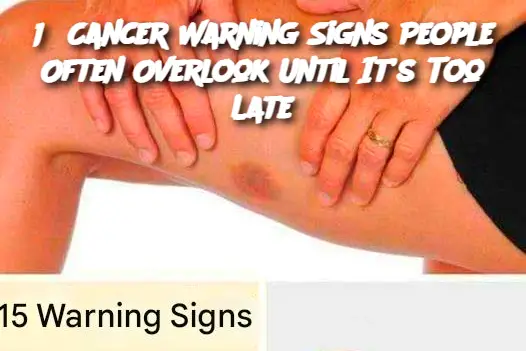ADVERTISEMENT
Introduction
Cancer is a disease that affects millions of people worldwide, and while early detection can significantly improve the chances of successful treatment, many of its warning signs are subtle and easy to ignore. Oftentimes, individuals may dismiss symptoms as normal or minor health issues, only to later realize they were signs of a much more serious condition. Understanding the early warning signs of cancer can make all the difference in timely diagnosis and treatment. In this article, we’ll explore 15 common cancer symptoms that people tend to overlook but should never ignore.
1. Unexplained Weight Loss
One of the most concerning signs of cancer is sudden, unexplained weight loss. While minor fluctuations are normal, a significant drop in weight—especially without changing your diet or exercise routine—can indicate an underlying issue, such as cancer. It’s particularly common in cancers of the pancreas, stomach, esophagus, and lung.
2. Persistent Fatigue
Feeling excessively tired despite getting enough sleep can be a sign of cancer, particularly leukemia, colon, or stomach cancer. If fatigue persists and doesn't improve with rest, it's worth consulting a doctor to rule out serious health conditions.
3. Unexplained Pain
Pain that persists without a clear reason or doesn’t respond to regular treatment could be a red flag for cancer. Back pain, headaches, and joint pain can all be indicative of various cancers, especially if they continue to worsen over time.
4. Changes in the Skin
Skin changes, such as new growths, moles that change in size, color, or shape, or a sudden increase in the number of freckles, can be a sign of skin cancer. Any unusual changes in the skin should be examined by a healthcare provider immediately.
5. Persistent Cough or Hoarseness
A cough that lasts more than three weeks or hoarseness that doesn’t go away can be a sign of lung or throat cancer. Even if you don’t smoke, persistent coughing or voice changes should be evaluated.
6. Difficulty Swallowing
If you experience difficulty swallowing or a sensation that food is stuck in your throat or chest, it may indicate esophageal or throat cancer. This symptom often gets worse over time, making it harder to eat or drink.
7. Changes in Bowel Habits
Persistent changes in bowel movements, such as diarrhea, constipation, or changes in the appearance of stool, may indicate colon cancer. Blood in the stool is another concerning sign that should not be ignored.
8. Unexplained Bleeding
Unexplained bleeding is another sign that shouldn’t be overlooked. This can include coughing up blood, blood in your stool, abnormal vaginal bleeding, or blood in your urine. These symptoms can be indicative of cancers in various organs, such as the lungs, colon, bladder, or reproductive system.
9. Persistent Fever
A fever that lasts for weeks without an obvious cause can be a sign of leukemia or other cancers that affect the immune system. It may occur when the body is fighting off infection or because cancer has spread to other parts of the body.
10. Lumps or Masses
Lumps or masses that appear on the body, especially in the breast, neck, or abdomen, can be a sign of cancer. Not all lumps are cancerous, but they should always be evaluated to rule out potential malignancies.
11. Indigestion or Trouble Eating
Feeling full after eating only small amounts, or experiencing frequent indigestion, heartburn, or nausea, can be a sign of gastrointestinal cancers, including stomach, pancreas, or liver cancer.
12. Unexplained Changes in Mouth Sores
Mouth sores or ulcers that do not heal, particularly if they are painful, may indicate oral cancer. Red or white patches inside the mouth or on the tongue, along with pain or bleeding, require medical attention.
13. Persistent Headaches
While headaches are common, persistent and worsening headaches could indicate a brain tumor. If the headaches are accompanied by nausea, vomiting, or changes in vision, seek medical advice promptly.
14. Unexplained Night Sweats
Night sweats—profuse sweating during sleep that soaks your clothes and sheets—can be a sign of lymphoma or other cancers. This can happen without fever, making it a less obvious warning sign.
15. Swollen Lymph Nodes
Swelling of the lymph nodes, especially those in the neck, armpit, or groin, can be a sign of lymphoma or other cancers. While swollen lymph nodes can occur due to infections, persistent swelling warrants medical evaluation.
Serving and Storage Tips
How to Take Action:
If you experience any of these warning signs, it's essential to seek medical attention promptly. Early detection through diagnostic tests, including imaging or biopsies, is critical for proper treatment and increased survival rates. Don’t wait for symptoms to worsen or be dismissed.
Preventive Measures:
Regular checkups and screenings can help detect cancer in its early stages, even before symptoms arise. Follow your doctor’s advice on screenings for breast, colon, cervical, and other cancers, especially if you have a family history of cancer or other risk factors.
Variations
ADVERTISEMENT
